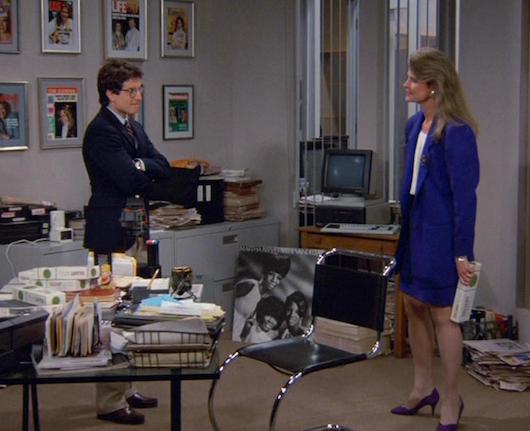
A Lonely Lie
by DICK CHENEY
Great News
creator Tracey Wigfield
NBC
 Nothing short of a writer's strike could ever stop the people who work in television from making shows about themselves. These approximations/reflections had various levels of reality built into them until NBC's Great News, which concerns a local New Jersey newscast that does stories about homicides in Texas for some reason. Accepting this level of seriousness is pretty much de rigeur these days – imagine a television show being important to anyone outside of the people who star in it? – but it took me back to 1988.
Nothing short of a writer's strike could ever stop the people who work in television from making shows about themselves. These approximations/reflections had various levels of reality built into them until NBC's Great News, which concerns a local New Jersey newscast that does stories about homicides in Texas for some reason. Accepting this level of seriousness is pretty much de rigeur these days – imagine a television show being important to anyone outside of the people who star in it? – but it took me back to 1988.
I argued strongly and with visual aids of Dan Quayle's face on the head of a horse that I should have been the vice president on the 1988 presidential ticket. You see, Dan would spend most of his free time hate-watching Murphy Brown, the seminal CBS sitcom that in a way created all of us. He would post on the show's messageboards begging the creators to give investigative reporter Frank Fontana more screen time, or a spin-off called Fontana.
Candice Bergen did a service to every single person hovering around the age of 40 on this show. She was presented as a recovering alcoholic who later decided to have a baby in 1991, and a situation that was all completely fine. This state of affairs incensed Dan Quayle a lot. "Why would an attractive single woman have a baby?" he screeched, tearing his hair out and jutting his pelvis at me as if I were unsure how children were in fact produced.

Murphy Brown actually had a real job. In those halcyon days, Murphy Brown creator and all-around legend Diane English made it seem like people cared what the news reported. Granted, national newcasts did have a lot more weight when CBS was like one of seven channels you got on the air. Murphy had this beautiful office that had no windows, but it was still very cozy. I still don't understand why she had all these magazine covers on the wall; maybe she had a print background. All her coworkers were for the most part sexist assholes, but she just put them in her place. When she went home, she had this great house where she was sleeping with her cute house painter (Robert Pastorelli, predictably dead of a drug overdose in 2004) who hung around. I never really understood that relationship until my wife explained it to me.
Murphy Brown was actually referenced by Dan Quayle publicly in the 1992 presidential race, because he hated the idea of a woman having a child without a man that much. I guess he thought it was real or maybe just important, and it kind of was. Candice Bergen had just the right amount of toughness and grit to have a baby and keep on working her job. You had to admire her; also she was perfect in every conceivable aspect. She even wore pantsuits at home, even when she was just relaxing comfortably after a tough day.

Briga Heelan plays a producer named Katie in Great News. Her Jewish mother gets a job as an intern on her newscast, which leads to her shouting "Mom!" a lot when her mother screws up which piece of tape they should be running before air. Creator Tracey Wigfield does not really care how actual news is produced. Great News is more going for how it was revealed that the entire run of Newhart was just a dream of the character in The Bob Newhart Show. Despite being evidently Irish, Katie has a Jewish mother named Carol Wendelson, played by the Armenian-American comedian Andrea Martin.

Since the entire show is really about whatever Catholic upbringing Tracey Wigfield suffered through as a child, it would only have been appropriate for her to cast herself in the lead role. (As The Mindy Project showed, she is a fantastic comedic performer.) Looking back at 30 Rock, the insanely verbose show that Wigfield wrote with Tina Fey, I don't understand 60 percent of the jokes that were made in it. Like Great News, the show is about a talented woman who falls in love with her gruff but exasperating boss. This storyline has not aged well after Bill O'Reilly harassed all those women, and yet the topic of sexual harassment in the workplace is treated very lightly in Great News.

Nicole Richie plays one of the show's two anchors. All of her jokes are about what a terrible millennial she is, and most of her sentences end with a hashtag of some sort. An extremely recurring joke is that Richie's character, Portia Scott-Griffith, will say a word that has a double meaning for people of each generation. For young folks, it will mean the name of a rapper, but for older people it will represent a food product. Are you laughing, because if you are not, or if you do not know the name of every single working rapper today, you will not enjoy Great News.
As Dan Quayle feared, none of the women or men in Great News are married or are particularly concerned about their wives, husbands, girlfriends or boyfriends. "I'll never have a real relationship," Katie tells her mother as she goes through the e-mails of a guy who is living in her apartment for a week, even though Briga Heelan herself is married with a kid. This is how you know that Great News is someone's nightmare – there is no chance of any of these fictional characters reproducing or caring for children, which maybe is for the best. They are a lot more invested in topics like a bear rampaging through Central Park or the comfort of hugging your mother in the workplace when you feel sorta down.
Dick Cheney is the senior contributor to This Recording. You can find an archive of his writing in these pages here.
